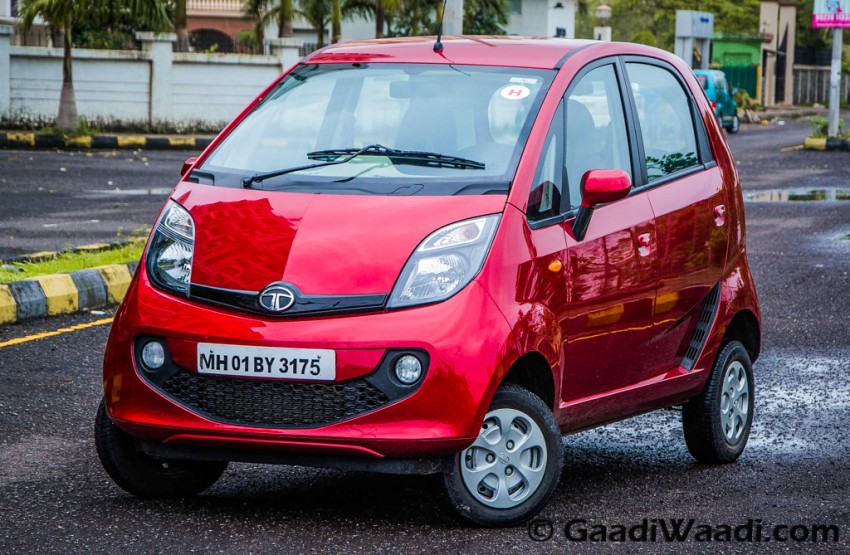
The Tata Nano will remain as an excellently engineered compact milestone despite its shortcomings and a fitting cheapest car in the world
The World’s cheapest car had its ups and down throughout its historic run of over a decade. Having received international reputation for being the most affordable car on the planet, the Nano had soon become an emotional factor for Tata Motors. The reign of Nano had divided opinion and with just single unit sold in June 2018, it has eventually been axed.
In contrast, Tata sold nearly 75,000 examples of the Nano budget car in FY2011-12. Tata still says the Nano will be rolled out of production if customers order in prior, just to salvage your thoughts if you’re someone like me who really liked the existence of it. Personally, I would consider Nano as one of the Indian automotive industry’s masterpieces despite its struggles and the persistent denunciation.
But, what does the world media has to say about the Tata Nano’s departure? We examine that here:
Motor 1
Motor 1 argued about the lack of safety features in the Nano playing a major role in Indian customers opting for higher priced alternatives. According to them:
“..not financially mobile Indians wanted association with the world’s cheapest car. It also didn’t have the best reputation with safety, which is important for consumers looking to get the best bang for their buck”
“The death of the Nano – which was plagued with problems since 2008 – shows how much emphasis is placed on cars to be a status symbol. Just because the Nano satisfied the majority of consumers’ needs, doesn’t mean it’s the car they want.”
Paultan
Another argument from Paultan is that not all the time being the most affordable car acts as an USP and Tata should build a probable electric variant from the ground up:
“In the end, being cheap wasn’t exactly a selling point, especially if going that route wasn’t safe. There’s talk that electrification may resurrect the Nano, but by all accounts it looks simpler to start with a cleaner slate.”
The Truth About Cars
While emphasising the importance on safety, The Truth About Cars believes that the Nano was not inspirational enough:
“Frankly, India’s “people’s car” was just too cheap, too bare bones, and not aspirational enough. Safety on India’s notoriously congested and relatively lawless highways was another concern. Germany once crash tested the Nano and found it warranted zero stars.”
Automotive News
Auto News iterates on the fact that the Nano needs new investment for an upgraded avatar to arrive and more crucially to meet the upcoming safety regulations:
“Tata remains hopeful: A spokesman for the group said the Nano “may need fresh investments to survive.” Yet the evidence suggests that pursuit of the lowest price above all else was misconceived. A more realistic view is that India is squarely a high-volume, few-models game and consumers are focused on value, which means getting as many features as possible for their money.”
Leftlane News
The Nano’s persistent gremlins did plague its sales prospects as people struggled to find it as an affordable alternative for motor bikes, said Leftlane News:
“Its image as a poor man’s car did little to lure buyers into showrooms. Widespread reports of the Nano’s superb flammability also discouraged many motorists from signing the dotted line. Finally, safety concerns — it scored zero stars in a European crash test — made it a questionable purchase for those in need of an affordable vehicle to carry a family.”
Autocar UK
One of the primary reasons for the Tata Nano’s downfall was it being obsolete and could not address the modern expectations of the buyers, stated Autocar UK:
“Experts claim that this is as much an example of the rising expectation of Indian consumers as it is a reflection of how dated the back-to-basics car, which entered production in 2008, had become.”
Jalopnik
Acknowledging the Nano, Jalopnik lauded the small car as a milestone in automotive design and said it had done what it was set out to do:
“I don’t care what you think about the Nano or how crappy you imagine it may be, the truth is that Tata developed a real, functional car for a fraction of the price anyone would have expected as reasonable, and that’s a no-joke engineering triumph.”
“The Tata Nano, I believe, is a milestone of automotive design and an unqualified engineering triumph, and I think it deserved a much better fate than to fade away, unwanted, because it was too good at its intended job of being the least expensive car possible.”

